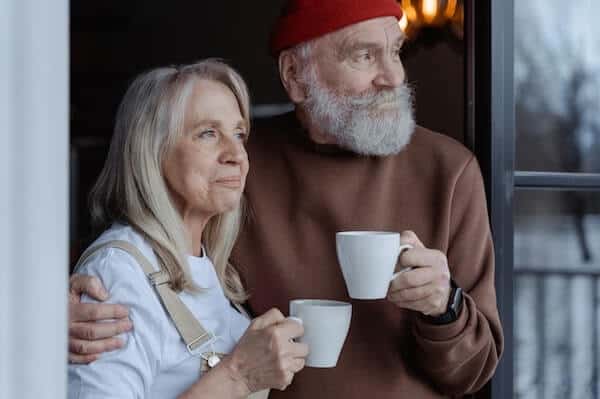Winter Safety Tips for Seniors: Staying Warm in Cold Weather!

If it seems that grandmother’s house is considerably warmer than your own during the winter, there is a good reason for that. Seniors suffer from colder temperatures to a considerably greater degree than other adults groups.
Did You Try Out Our Life Insurance Quote Comparison Tool? Save BIG!
While much of the focus during the summer is on the effects of heat, cold actually kills far more people. While heat exhaustion and heat stroke are certainly dangerous conditions, they are not nearly as prevalent as hypothermia when temperatures are cold enough to damage the body and vital organs.
As people enter their golden years, their bodies become less able to generate and trap heat. This is especially true for seniors who have little in terms of body fat. When combined with the weakening of the immune system, seniors become more vulnerable to the cold than younger adults.
And seniors may suffer severe medical conditions and die from the cold. That is why it is so important for seniors to be properly protected from the cold. Otherwise, they become vulnerable to hypothermia which can cause serious issues.
What Temperature is Too Low for the Elderly?
There is no precise temperature that applies to all seniors. That’s because everyone is slightly different in terms of how their body reacts to dips in temperatures. However, a baseline can be followed when setting the temperature on the thermostat.
FREE Quotes, No Obligations!
Put simply, the temperature inside the home should be at least 70 degrees F. While it is recommended that people turn the heat down during the winter to conserve energy and lower electricity bills, seniors can suffer from hypothermia at temperatures that reach 62 to 65 degrees F.
Therefore, the inside of the home should be around 70 degrees F. To help lower energy bills, shut the doors of rooms that are not being used. And place towels in front of doors to keep the draft out.
How Does Cold Weather Affect the Elderly?
Hypothermia occurs when the body’s temperature gets below 95 degrees F. Under such conditions, the effects can be pretty severe. From liver damage to kidney issues, the most serious may be cardiac arrest or a heart attack. Other conditions include becoming more vulnerable to frostbite, which may cause the loss of skin or even toes depending on the extent of the cold.
Although people of all ages can suffer from hypothermia, seniors have the most issues because their body defenses are less responsive than younger adults.
Although seniors are more vulnerable to such conditions, they can be prevented if properly protected. This means ensuring that their skin does not touch cold surfaces for long periods. Because the skin of seniors can become frail, they are less sensitive to the effects of colder temperatures. The result is that they may not be aware of what is happening to their skin and body until it is too late.
Compare life insurance quotes and save!
Why Do the Elderly Get Cold Easily?
Although people of all ages can be affected by winter’s cold temperatures, seniors are especially vulnerable. This is because the body’s response to the cold tends to fade during the senior years. Older people can lose body heat at a faster rate as well. This combination means that seniors are considerably more vulnerable to the cold.
Add to this, the skin of people who are elderly tends to be fragile. This makes it more vulnerable to colder temperatures, and damage may occur. But the real culprit for many seniors is the underlying medical conditions that they suffer from to a greater degree than children and adults.
ArthritisDiabetesLoss of MemoryThyroid IssuesParkinson’s Disease
Memory loss is an indirect condition that shows up when seniors forget to wear the proper clothing before going out on a cold day.
How to Keep the Elderly Warm?
The first rule is to be aware of their surroundings. It does not take below-freezing conditions to cause hypothermia. In fact, temperatures below 70 degrees F can do it under the right conditions. If the conditions for hypothermia exist, then you should do the following.
Make sure they are well dressed in layersKeep them moving if at all possibleProtect them from the wind and moisture getting under the clothing if outsideCreate a warm place for the elderly to relax and avoid the cold conditions.
You should create a simple procedure to help keep your elderly family and friends warm and safe if they have difficulty doing so themselves.
Prepare for Cold Days: The elderly will need the following items before winter arrives.
Blankets, Gloves, and CoatsHead and Ear ProtectionSocks, Proper Footwear, and Thermal Underwear
Also, have the heating system checked before winter arrives to minimize the chances of a breakdown occurring. Have a 24/7 emergency number for heating repair available. This will have the service back on as quickly as possible.
Know the Signs of Hypothermia: Understanding the early signs of hypothermia will alert you to their condition. The faster you can react, the less likely an older person will suffer the effects. The early warning signs include the following.
Cold Hands & FeetSwollen, Puffy FacePale Skin, ShiveringSlurred or Slowed SpeechIrritable or Being Unusually Sleepy
It’s easy to mistake such warning signs for something else. Check the room temperature and make sure they are adequately covered. The later symptoms of hypothermia are as follows.
Slow Movement, Trouble Walking, ClumsinessSlow Heartbeat, Shallow Breathing, or Blacking Out
Call 911 right away if you confirm signs of hypothermia. The faster it can be treated, the more likely it is that permanent damage or worse can be avoided.
Protecting your elderly relatives and friends from the cold starts with awareness, preparation, and knowing what to do if the worst should occur. Avoiding unnecessary exposure to the cold and applying for the proper protection when it cannot be avoided will help keep seniors safe.






